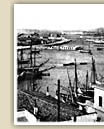
(railways, the canal at Isthmus of Corinth and so on) had built up a large
external public debt that the state could not meet.
The bankruptcy of 1893 was a fatal consequence. This terrible plight dramatically burdened
the international financial state of the country. The defeat
in the 1897 war led to the same result. Greece was compelled to pay war indemnities to Turkey, which put forward
immediate payment as a condition for the withdrawal of its troops from Thessaly.
In order to pay this sum (4,000,000 Turkish liras or 95,000,000
golden francs of the time) the Greek state had to raise foreign loans,
but world capital markets were not willing to supply new loans, if old credits were not settled.
Given Greece's immediate economic needs, foreign creditors and the Great Powers were able to impose on Greece a mechanism of financial control, in order to ensure the payment
of the capital and the interest on old and new loans.
From April 1898 the International Financial Control Commission (IFCC) was established
in Athens; it was initially termed International Control Commission, but despite
the change of name it was known as 'Control'.
The commission consisted of six members, representatives of the Great Powers
whereas revenues from the monopoly of salt, oil, matches, decks, cigarette paper, tobacco,
paper stamps and the tariffs of the port of Piraeus passed under its control. These and other
revenues, if the need arose, were disposed of to serve the country's loan obligations,
while the Commission had the capacity to intervene in various sectors of the civil services
in order to ensure the sufficient and, in time, payment of economic obligations to creditors.
It is worth mentioning that in that same period similar situtations emerged
in other Balkan countries, the eastern Mediterranean, and even South America
but with looser terms, as control has not been imposed after
an international treaty and following the terms of a military defeat.
|
 |
